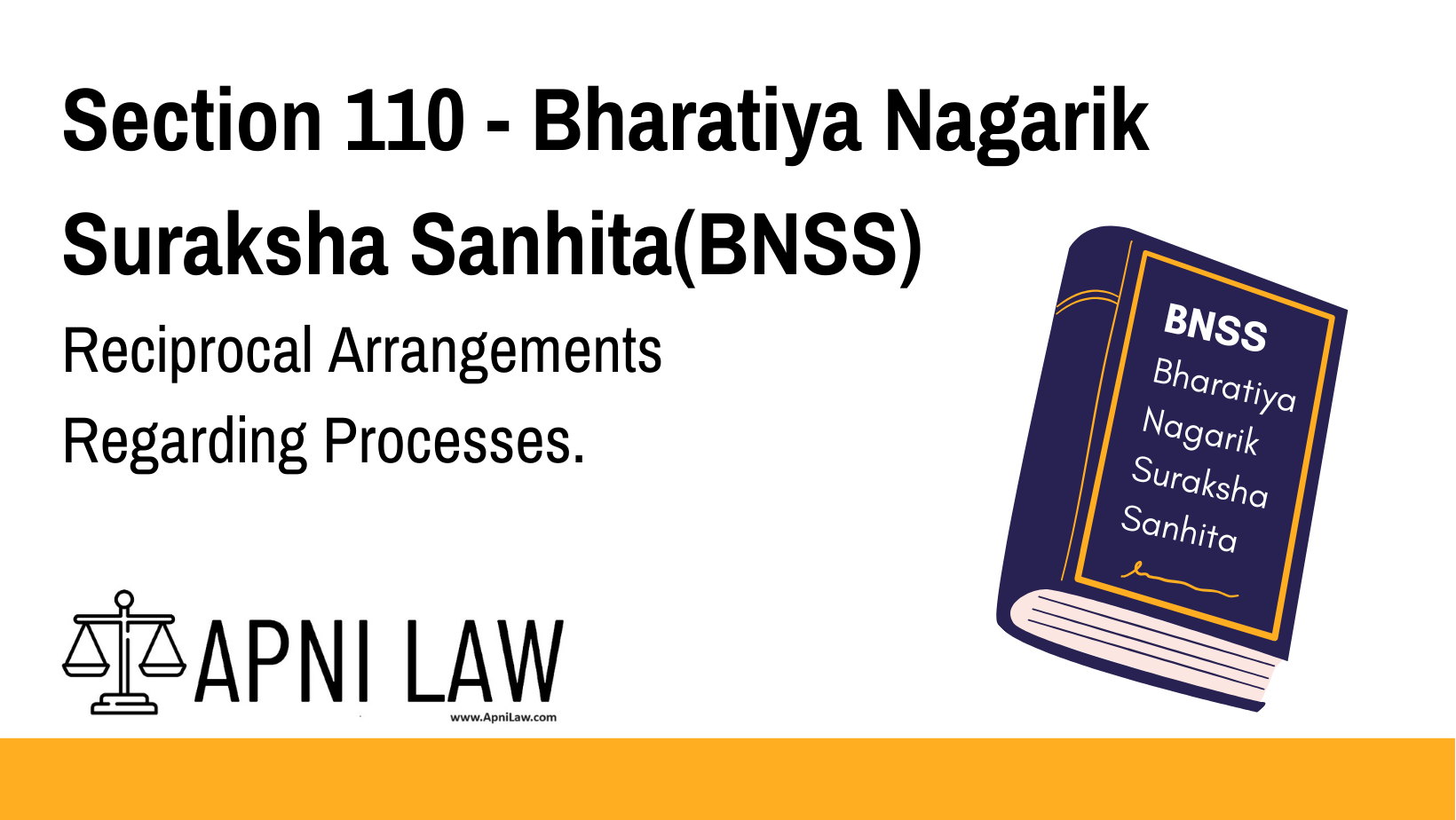BNSS Section 110: Reciprocal Arrangements Regarding Processes
This section of the Bharatiya Nagarik Suraksha Sanhita (BNSS), which replaced the Code of Criminal Procedure (CrPC), deals with the service or execution of summons, warrants, and search warrants issued by courts in different jurisdictions.
Let’s understand what reciprocal arrangements regarding processes under this Act means:
1. Service or Execution Within India:
Summons, Warrants, and Search Warrants: If a Court within the territories covered by this section desires to serve or execute:
– Summons to an accused person
– Arrest warrant of an accused person
– Summons to any person to attend and produce documents or other things
– Search warrant
– Within India:
2. Service or Execution Outside India:
– If the service or execution is required in a country or place outside India with which the Central Government has made arrangements (contracting State):
– The Court within the territories may send such summons or warrant in duplicate to the specified Court, Judge, or Magistrate in that contracting State, as notified by the Central Government.
3. Execution Upon Receipt:
– When a Court within the territories receives for service or execution:
– Summons to an accused person
– Arrest warrant of an accused person
– Summons to produce documents or other things
– Search warrant
– Issued by:
– A Court in any State or area in India outside its territories
– A Court, Judge, or Magistrate in a contracting State
Authorities must execute them as if they received them from another court within their own territories for service or execution.
4. Procedure for Execution:
If an arrest warrant is executed, authorities must process the arrested individual according to the procedures outlined in Sections 82 and 83 as much as possible.
– Search Warrant:
When executing a search warrant, authorities should handle the items found according to the procedures specified in Section 104 as much as possible.
5. Forwarding Documents or Things:
If a contracting State executes a summons or search warrant, the relevant authorities must forward the produced or found documents or items to the issuing court through the authority specified by the Central Government
This section outlines the procedures for cross-jurisdictional service and execution of legal documents and warrants within India and with contracting States outside India, ensuring cooperation and compliance in criminal matters.
Explanation:
This section outlines the procedures for serving or executing legal documents across different jurisdictions within and outside India, ensuring smooth operation of the judicial system in cross-border cases.
- Inter-State Service/Execution:
Reciprocal Arrangements Regarding Processes
When a court in one state needs to serve or execute a summons, warrant, or search warrant in another state within India, it can therefore send the document in duplicate to the presiding officer of the court in the other state. Additionally, this practice promotes effective communication between courts across different states. Ultimately, it helps uphold the rule of law and facilitates timely legal proceedings.
- International Service/Execution: For serving or executing legal documents in countries outside India, the Central Government must have established arrangements with the respective country. In such cases, the relevant authorities will therefore send the documents in duplicate to the designated authority or court in the other country. Authorities carry out this process by following the procedures specified by the Central Government. Ultimately, this approach facilitates effective communication and collaboration between jurisdictions.
Illustration:
Imagine a case where a court in Delhi needs to arrest a suspect residing in Mumbai. Under Section 110, the Delhi court would send a warrant for the suspect’s arrest to the presiding officer of a Mumbai court. Subsequently, the Mumbai court will then execute the warrant and arrest the suspect. For further legal proceedings, the suspect will be brought to Delhi. In this manner, the judicial process ensures that all necessary steps are taken to uphold the law and facilitate the suspect’s transfer for trial. Ultimately, these actions reflect the court’s commitment to maintaining legal order and accountability.
Questions and Answers:
Q. The documents are not served or executed in other jurisdictions?
If the document is not served or executed in the other jurisdiction, the relevant authorities must take appropriate measures to address the failure. This may include reporting the issue to the court and seeking alternative methods to ensure compliance with the legal requirements.
Q: What are the procedures for service or execution of documents in a contracting state?
A: The Central Government specifies the form, direction, and authority for transmission of documents in contracting states through notification.
Q: What happens to the documents or things seized during a search in a contracting state?
A. The designated authority may not serve or execute the document within a reasonable timeframe. The court that issued the document can take appropriate steps, such as issuing a fresh summons or warrant.











